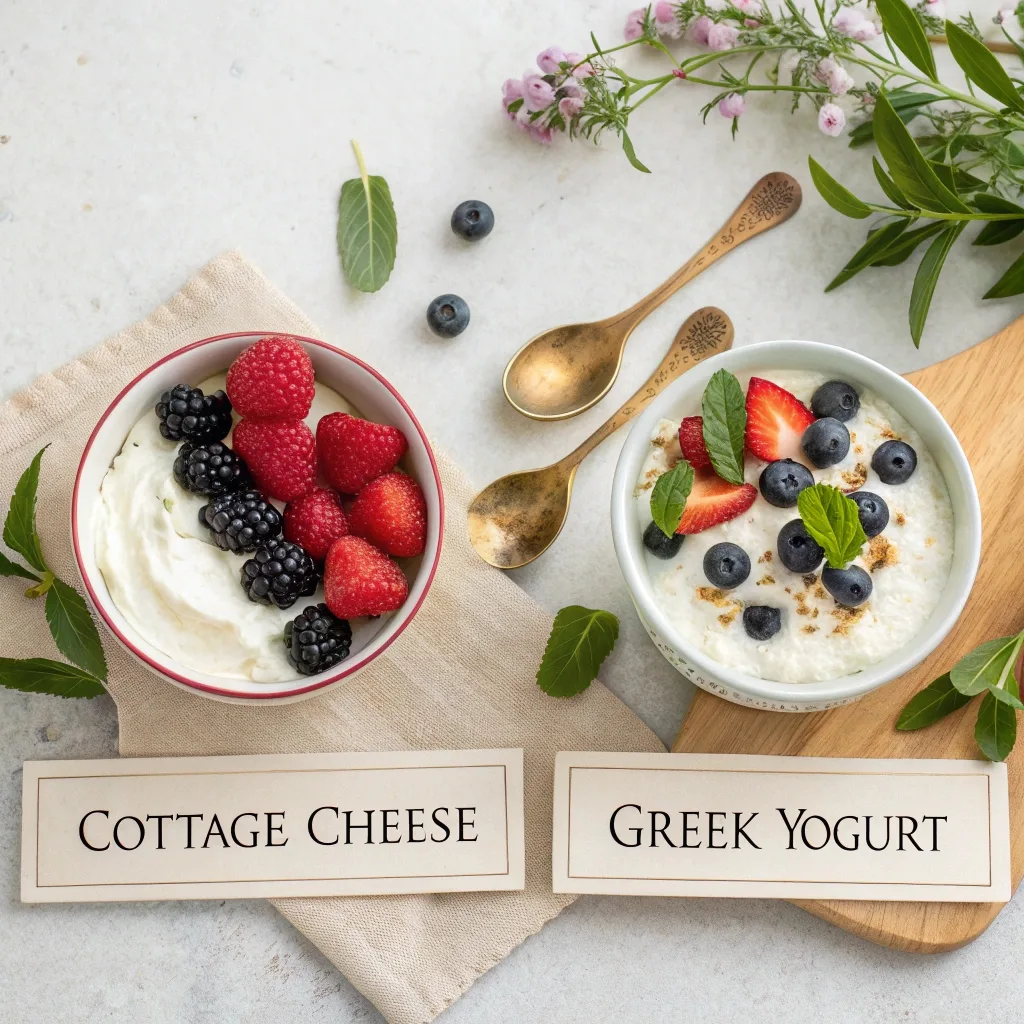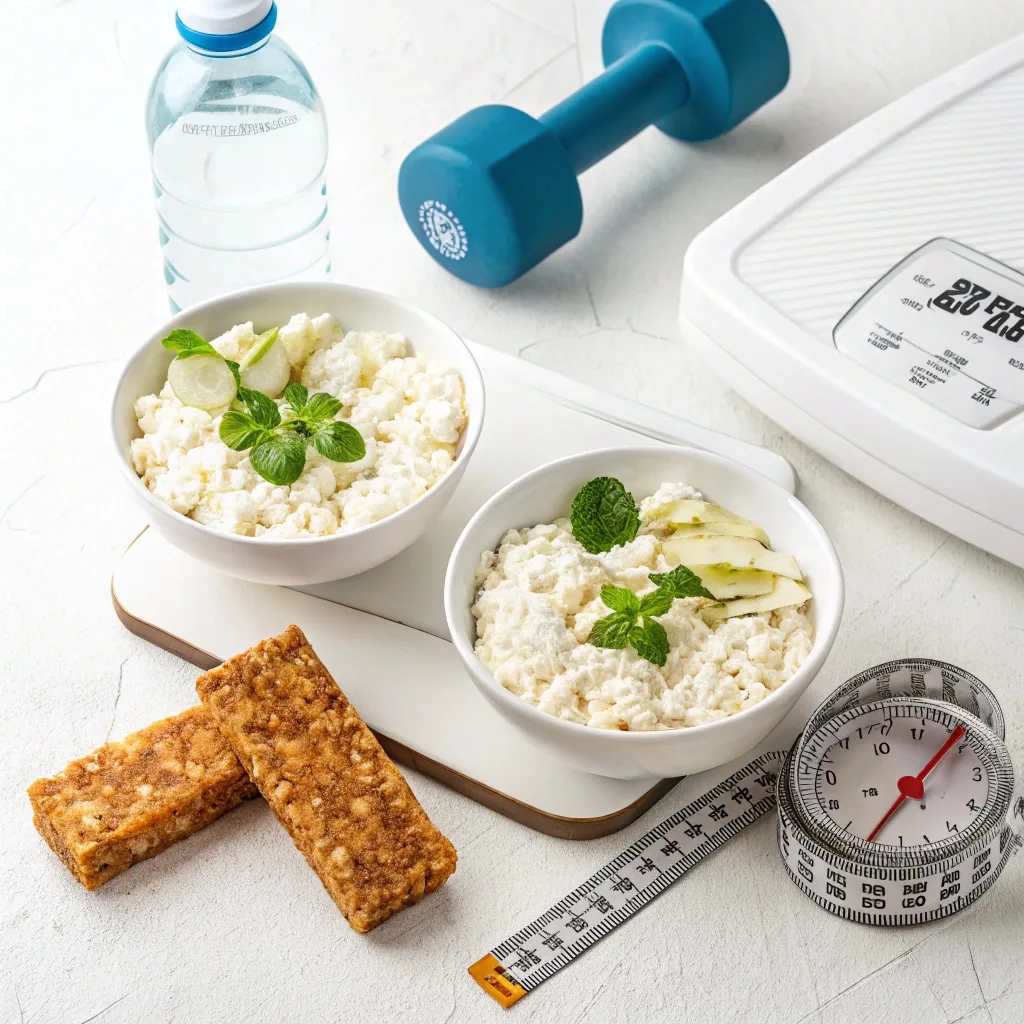If you’ve ever stood in front of the dairy aisle wondering whether to grab cottage cheese or Greek yogurt, you’re not alone. Both have long histories, boast solid nutritional reputations, and offer unique tastes and textures. But when it comes to deciding which one deserves a spot in your daily routine or your next recipe, the choice isn’t always clear. This article takes a closer look at cottage cheese and Greek yogurt, diving into taste, nutrition, and health benefits to help you make a confident (and delicious) decision.
Table of Contents
Cottage Cheese and Greek Yogurt: Which One Is Healthier and Tastier?
A childhood kitchen filled with creamy comfort
My journey with cottage cheese and Greek yogurt started in my mom’s tiny, sunlit kitchen. I remember waking up to the smell of warm toast and the sight of a cold bowl of cottage cheese drizzled with honey or stacked with peaches. It wasn’t fancy just comforting. Years later, when I began experimenting with recipes for Cheese and Recipes, I rediscovered these simple ingredients and was surprised at how versatile they were.
Greek yogurt entered my kitchen a bit later. I had heard the health buzz, sure, but it was the thick texture and tangy depth that truly grabbed me. I started substituting it for sour cream, mixing it into sauces, and spooning it over roasted veggies. And that’s when I realized: both cottage cheese and Greek yogurt were creamy powerhouses, each bringing their own magic to meals.
Why cottage cheese and Greek yogurt matter?
Both of these dairy products are protein-packed, relatively low in carbs, and rich in probiotics (depending on the brand). But they’re not interchangeable in every situation. Cottage cheese has a lumpy texture and a mild, slightly salty taste. Greek yogurt is thick, smooth, and tangy. Your preference might depend on what you’re making or what your tastebuds are craving.
If you’re new to these ingredients, or just want to understand which one’s better for your goals (whether that’s building muscle, cutting carbs, or adding richness to a dip), this guide is for you.
While you’re reading, don’t miss our cheesy high-protein breakfast bowls or our Greek yogurt herb dip, they’re perfect for trying both options!
Nutritional Face-Off : Cottage Cheese vs Greek Yogurt
Protein power and calorie control

When it comes to cottage cheese and Greek yogurt, both earn high marks for being protein-rich, but the numbers can vary. A standard ½-cup (113g) serving of low-fat cottage cheese offers about 12–14 grams of protein, while the same serving of plain, non-fat Greek yogurt clocks in around 10–12 grams. Not a massive difference, but depending on your macros, it might sway you.
Calorically, cottage cheese tends to be slightly higher if you choose full-fat versions. However, the fat content can make it more satisfying, keeping you fuller longer. Greek yogurt, especially the non-fat kind, offers a lower-calorie alternative that’s great for smoothies, dressings, or snacking.
Here’s a quick glance:
| Nutrient | Cottage Cheese (½ cup, low-fat) | Greek Yogurt (½ cup, plain non-fat) |
|---|---|---|
| Calories | 90–100 | 60–80 |
| Protein | 12–14g | 10–12g |
| Fat | 2–5g (varies by type) | 0g (non-fat) |
| Carbs | 3–6g | 4–6g |
Vitamins, minerals, and probiotics
Both Greek yogurt and cottage cheese are great sources of calcium, but Greek yogurt usually wins in that department. It also delivers more potassium and probiotics, especially if you buy live-culture varieties. Cottage cheese does offer B12, selenium, and phosphorus, which support metabolism and bone health.
Probiotics are a key reason many people choose Greek yogurt, but did you know some brands of cottage cheese also contain live cultures? Check the label. If gut health is a priority, Greek yogurt may still be the safer pick, but cultured cottage cheese can work too.
Try adding it to our gut-friendly breakfast bake or this calcium-rich cheesy veggie bake for double the nutrition.
Health Benefits and Dietary Roles of Cottage Cheese and Greek Yogurt
Best for weight loss and calorie control?
If you’re trying to lose weight, Greek yogurt and cottage cheese both offer lean, filling fuel. Greek yogurt’s high protein and low calorie count make it perfect for breakfast bowls or post-workout snacks. Its creamy texture also satisfies cravings for something rich, without packing in fat.

Cottage cheese, especially low-fat varieties, is just as effective. The protein keeps you full longer, reducing overall calorie intake throughout the day. It’s a popular choice in high-protein, low-carb diets like keto or Atkins. The sodium can be a bit higher in cottage cheese, so it’s smart to check labels if you’re watching salt.
Many bodybuilders and athletes actually prefer cottage cheese before bed because it contains casein protein, which digests slowly and supports overnight muscle recovery.
Try our low-carb cheesy egg muffins or Greek yogurt breakfast cheesecake both excellent for calorie-conscious meal prep.
Gut health, digestion, and intolerances
When it comes to gut health, Greek yogurt is the frontrunner. It’s loaded with live cultures and probiotics that support digestion, improve microbiome balance, and may reduce bloating or inflammation. It’s a natural choice if you’re dealing with digestive issues or just want to feel more regular.
Cottage cheese, unless it’s explicitly labeled with active cultures, isn’t typically probiotic-rich. However, it’s lower in lactose than some yogurts, which could make it easier to tolerate for those with slight lactose sensitivity.
Both options offer benefits depending on your digestive needs. For example, someone with IBS might do better with low-lactose cottage cheese, while someone with acid reflux may prefer the cooling effect of Greek yogurt.
Pair either with our cheesy zucchini gut bites or fermented yogurt flatbread to create digestion-friendly snacks with flavor and function.
Taste, Versatility, and Cooking Potential
Flavor profiles and textures you can play with
Let’s be honest: when it comes to cottage cheese and Greek yogurt, taste and texture can be deal-breakers. Cottage cheese is lumpy, mildly tangy, and often salty. It’s a love-it-or-hate-it ingredient, but when paired well, it can be silky, savory, and deeply satisfying. Greek yogurt is thicker, creamier, and slightly tart, making it easier to substitute into both sweet and savory recipes.
If you’re a texture-sensitive eater, Greek yogurt usually wins for consistency. It spreads smoothly, stirs easily, and blends well into dressings or smoothies. Cottage cheese, on the other hand, can be whipped for a creamier finish or even blended into dips and batters.
Looking for inspiration? Check out our whipped cottage cheese snack bowl or try a Greek yogurt jalapeño ranch dip both show how the right flavors can turn texture quirks into major culinary wins.
Best uses in recipes: savory, sweet, and everything in between
Here’s where the real fun begins. Cottage cheese shines in savory dishes. Think stuffed shells, cheesy omelets, lasagna, or even grilled cheese add-ins. But it also works surprisingly well in pancakes or muffins, adding moisture and protein without overwhelming flavor.

Greek yogurt excels in baking and breakfast swirled into oats, dolloped onto fruit, or baked into banana bread. It’s also a natural sour cream alternative for tacos, baked potatoes, or creamy dressings.
Here’s a quick pairing guide:
| Dish Type | Best Option | Why |
|---|---|---|
| Smoothies & Breakfast Bowls | Greek Yogurt | Creamy texture and tangy balance |
| Stuffed Pasta or Savory Bakes | Cottage Cheese | Melts beautifully into savory layers |
| High-Protein Snacks | Either | Mix-ins and toppings make both shine |
You’ll love our cheesy taco cottage bake or no-bake Greek yogurt parfaits if you want fast, flavorful ideas.
Frequently Asked Questions (FAQs)
1. Is cottage cheese healthier than Greek yogurt?
It depends on your health goals. Cottage cheese typically contains more protein per serving and has slightly less sugar, making it ideal for low-carb or high-protein diets. However, Greek yogurt is often richer in probiotics and calcium, which may benefit digestion and bone health. The best choice depends on what you need—muscle fuel or gut support.
2. Can I eat cottage cheese and Greek yogurt every day?
Yes, both can be part of a daily diet. They’re nutrient-dense, high in protein, and support satiety. Choose low-sodium cottage cheese or plain, unsweetened Greek yogurt to avoid added salt or sugar. Always check ingredient labels if you’re watching sodium, fat, or lactose.
3. Why do bodybuilders eat cottage cheese?
Bodybuilders favor cottage cheese because it’s rich in casein protein, a slow-digesting protein that fuels muscle repair over time. It’s often eaten before bed to support overnight recovery. Plus, it’s low in carbs, making it ideal for cutting cycles.
4. Which is better for weight loss: Greek yogurt or cottage cheese?
Both are excellent for weight loss, but Greek yogurt is often lower in calories and fat, while cottage cheese can be more filling due to its higher protein. Choose based on your taste, dietary needs, and how you like to eat it—mixed into sweet bowls or layered in savory meals.
Conclusion: So, Who Wins?
When comparing cottage cheese and Greek yogurt, there’s no one-size-fits-all answer. Both are high-protein, nutrient-packed, and incredibly versatile. If you’re looking for smooth, tangy, probiotic-rich options, Greek yogurt is your go-to. But if you want a protein-dense, creamy addition to savory recipes, cottage cheese delivers every time.
The best choice? Keep both in your fridge. Use Greek yogurt in your morning smoothie or creamy dip. Save cottage cheese for hearty dinners, protein-packed snacks, or even sneaky dessert twists. Your taste buds and your body will thank you.
Still hungry? Try our cottage cheese stuffed peppers and Greek yogurt garlic spread to taste the difference yourself.

